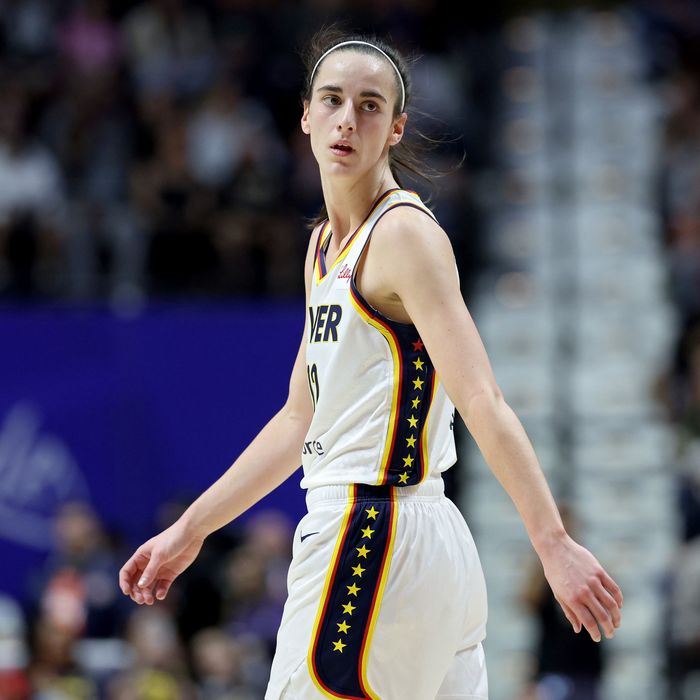

Caitlin Clark.
Photo: Elsa/Getty Images
Last week, when USA Basketball announced its roster for the upcoming Paris Olympics, there was one name conspicuously absent: Caitlin Clark. This led to the predictable, exhausting pseudo-debates that come up every time Clark is involved with anything. And it should be said once again that Clark herself has studiously and consciously excluded herself from all these debates, something that few of her most intense defenders seem to notice or care about (and of which I will confess having little desire to be dragged back into). But what was most telling about those lambasting USA Basketball for not choosing Clark was the rationale they often used. The argument was not that Clark was one of the 12 best women’s basketball players in the country — which she might be, or may soon be — but that USA Basketball was missing out on a vital marketing opportunity.
The most succinct version of this argument, written by someone who has covered countless Olympics and is a longtime and deeply respected advocate for women’s basketball, came from sportswriting legend and Red Smith Award–winning USA Today columnist Christine Brennan:
With Clark continuing to set records for TV ratings and attendance in her first eye-popping month in the WNBA as she did in NCAA basketball, it would have been inevitable: she would catapult U.S. women’s basketball to a place it so richly has deserved but has never attained — coverage from broadcasters and news organizations not just in the U.S. but around the world, headlines every day, and most important, vastly increased respect from a still male-dominated international sports media that has for decades focused almost exclusively on the U.S. men’s basketball team rather than the women, who are so good they haven’t lost since 1992.
Brennan’s argument, as you’d expect, is well reasoned, thoughtful, and persuasive, from the perspective of someone who has seen women’s basketball ignored for decades and is justifiably excited to see the increased spotlight that Clark brings to a sport that she (and millions of others) love. But it is based on a premise that is anathema to the entire notion of sports — that major decisions, whether they be roster construction or playing-time management, should be driven by marketing factors more than competitive ones.
For as long as sports competitions have existed, the goal has always been simple: to win. There are many other things to love about sports, but in the end, winning is what teams, players, and fans really care about.
This is not to say that marketing has never been a part of sports. Michael Jordan ushered an entire generation of athlete–as–celebrity front man industry leaders, and there isn’t a team, league, or network that doesn’t consider marketing in its decisions. My baseball team, the St. Louis Cardinals, is infamous for bringing in franchise legends like Albert Pujols and Matt Carpenter late in their career primarily for nostalgia purposes. But the understanding was always clear: They better hit, or they’re gone. Winning is the only thing that matters — it’s what makes sports sports.
The notion that a team should revolve its roster decisions for the Olympics — the biggest event in women’s basketball — around who is the most marketable is very new. It seems to be driven by the attention economy of the world outside sports, other scoreboards where follower counts matter, or page views, or TV ratings. It’s part of the increasingly pervasive American view that what matters is not the quality of one’s work, but whether it can be sold.
Why would Team USA not feel obliged to add Clark to the team? Well, maybe because it’s one of the best sports teams in the world. The U.S. women’s basketball team is 70-3 all-time in the Olympics and has won seven straight gold medals. It hasn’t lost a single game in any tournament since 2006. It is difficult to find any team playing any sport on the globe that has been more dominant over a two-decade span than the U.S. women’s team. They know what they’re doing. USA Basketball knows how to build a winning team, and picking an enormously popular player, who has only been in the WNBA for a couple of months, primarily because she’s enormously popular is not the way it has ever done it. They are trying to win a gold medal. That is supposed to be the point.
Sports leagues are occasionally seduced by the outside world of marketing, particularly with today’s influencer culture: The NBA has hired “content creator” correspondents to “cover” this year’s NBA Finals. Mr. Beast even sponsored the Charlotte Hornets’ jersey this season. But these moves always feel more like gimmicks dreamed up by ambitious young marketing associates than anything that moves any sort of needle. These cheap tricks come and go, and the numbers used to gauge their success — whether they’re follower counts or overnight streaming ratings — are never as important or as real as the result on the actual scoreboard.
Sports are real. The scoreboard is real, the games are real, the players are real, and all of these real things are judged in real time in front of millions of people. Unlike marketing, sports aren’t about vibes. The people who pick sports teams at the caliber of the Olympic Games aren’t thinking about marketing, nor should they. Because if you lose at the Olympics, most people will care a lot less about how well marketed you were than the fact that you lost.
Source link




